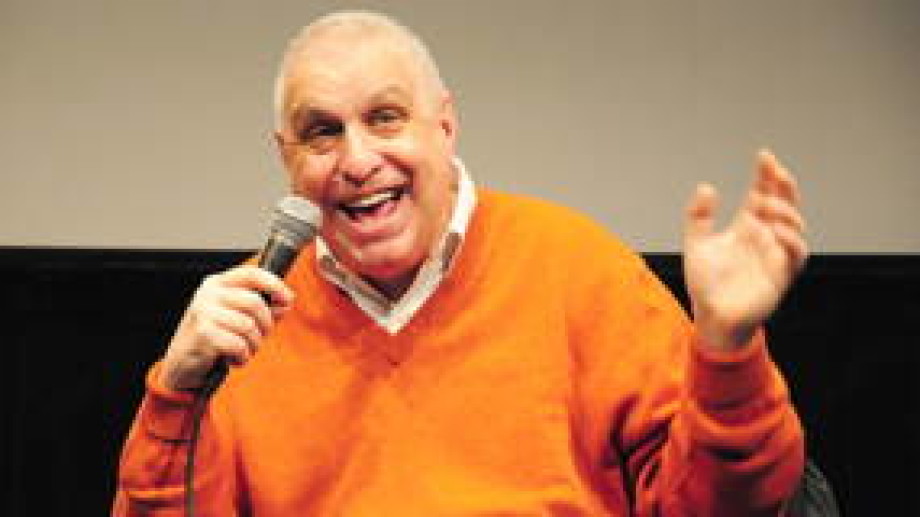
Photos by Julie Cunnah
Like many indie filmmakers, Errol Morris was racing against the clock as the premiere of his first film loomed. A finished print of the movie was so late in arriving for the 1978 New York Film Festival that he recalled standing in the bowels of Lincoln Center feeding fresh reels of his movie to the projectionist as they were rushed up to the booth from the DuArt film processing lab.Smiling in an orange sweater on stage at the Walter Reade Theater last week following a screening of Gates of Heaven, Errol Morris reflected on his first trip to Lincoln Center with the film more than 30 years ago.
After the 1978 showing, he said he got what is still his favorite audience question. It was actually more of a comment.
“This movie would be better cut in half,” a woman in the crowd told him. He shot back, “The same could be said for you!”
The story of American documentary filmmaking is often told from the perspective of the 60s verité movement. But, with his first film, Errol Morris was going against the grain and provoking a discussion.
Armed with untethered 16mm film cameras in the early 1960s, a group of American filmmakers redefined documentary. Robert Drew, The Maysles Brothers, DA Pennebaker and others pioneered an observational direct cinema movement in American documentary filmmaking. Errol Morris's Gates of Heaven offered an approach that was far from verité.
Told through interviews with subjects looking right into the camera, Gates of Heaven is the unexpected story of pet cemeteries and the people behind them. Consisting entirely of interviews and lacking narration, the film offers a unique portrait of an unseen segment of society even as it reaches broader topics about life and death.
Defining himself as “a kind of contrarian at heart,” Morris said that he sought to counter all the tenets of verité filmmaking. His camera was static, his set-ups were well lit, and he had his subjects looking directly into the camera. There could be no doubt that his documentary was crafted differently.
To hear Errol Morris tell it, however, audiences didn't know what to make of Gates of Heaven.
Born in New York in the late 40s, Errol Morris studied at Princeton before moving to Berkeley to focus on philosphy. While in the Bay Area, he programmed films at San Francisco's Pacific Film Archive. Douglas Sirk was among his favorites filmmakers at the time and was a filmmaker he screened at the venue. Being a fan of Sirk, Morris recalled last week, he was clearly excited when Gates of Heaven was invited to screen at the Berlin International Film Festival in the same year that Sirk would be in attendance.
To Morris's surprise, Sirk was puzzled by Gates of Heaven.
“You know, that's not a movie,” Douglas Sirk told Errol Morris about Gates of Heaven, “That's a slideshow.” Continuing, Sirk added in his comments to Morris, “You know it's possible that some people may look at [Gates of Heaven] ironically.”
The anecdote drew hearty laughs from the Lincoln Center audience, but Errol Morris said that he realizes the movie subverts the expectations of documentary viewers.
“It's such a strange and primitive film,” Morris admitted of Gates of Heaven, “It's almost an anti-film film.”
Morris followed up Gates of Heaven with the acclaimed Vernon, Fl, which debuted at the 1981 New York Film Festival, after which he was unable to get funding for another movie for quite some time. He worked as a private detective in New York for a bit to make money and eventually found his way back to filmmaking with the acclaimed The Thin Blue Line in 1988.
Despite his success in carving out new approaches to non-fiction filmmaking, the desire for a clearer documentary style continues to stalk Morris. After last week's screening of Gates of Heaven he was asked what the film is about.
“I don't know what it's about,” he shot back, “Is that part of my job description?”
This special event was part of Film Society of Lincoln Center's ongoing series 50 Years of the New York Film Festival, a year-by-year survey of NYFF's history leading up to its 50th edition this fall. Watch full video of the Q&A below and make sure to check out other films in the series.



